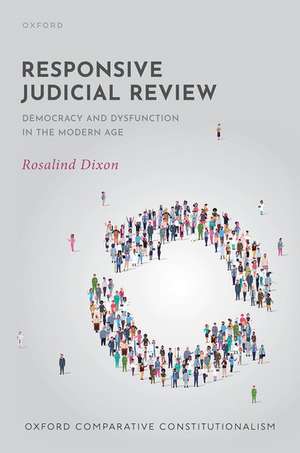Responsive Judicial Review: Democracy and Dysfunction in the Modern Age: Oxford Comparative Constitutionalism
Autor Rosalind Dixonen Limba Engleză Hardback – 16 feb 2023
Preț: 582.74 lei
Preț vechi: 834.24 lei
-30% Nou
Puncte Express: 874
Preț estimativ în valută:
111.52€ • 121.09$ • 93.68£
111.52€ • 121.09$ • 93.68£
Carte disponibilă
Livrare economică 22-28 martie
Livrare express 18-22 martie pentru 135.30 lei
Preluare comenzi: 021 569.72.76
Specificații
ISBN-13: 9780192865779
ISBN-10: 0192865773
Pagini: 320
Dimensiuni: 164 x 242 x 24 mm
Greutate: 0.62 kg
Editura: OUP OXFORD
Colecția OUP Oxford
Seria Oxford Comparative Constitutionalism
Locul publicării:Oxford, United Kingdom
ISBN-10: 0192865773
Pagini: 320
Dimensiuni: 164 x 242 x 24 mm
Greutate: 0.62 kg
Editura: OUP OXFORD
Colecția OUP Oxford
Seria Oxford Comparative Constitutionalism
Locul publicării:Oxford, United Kingdom
Recenzii
In this masterful work, Rosalind Dixon returns judicial representation-reinforcement to center stage in our understanding of judicial review. Her theory of how judicial intervention can counteract democratic dysfunction is rooted in rich examples and a breadth and depth of comparative expertise that reflects her position as a leading scholar in the field. What makes this book of exceptional importance is its close attention to the opportunities and challenges in operationalizing responsive judicial review; Dixon speaks directly to judges in outlining how constitutional courts might function as democracy-protecting and democracy-promoting. In presenting a theory of judicial review alongside guidance for its implementation, Dixon reanimates our aspirations for courts as valued participants in achieving a society committed to democratic responsiveness.
Comprehensive in its sweep, systematic in its analysis, and yet distinctive in its focus, Rosalind Dixon's insightful book is a major contribution to the growing comparative literature on political process approaches to constitutional review.
Professor Dixon has written a landmark book on the theory of judicial review. Using excellent examples drawn from around the world, she shows how courts should modulate their decision-making in response to legal, social, and political context. Her book will become the go-to resource for the field, on which all future work will build.
Comprehensive in its sweep, systematic in its analysis, and yet distinctive in its focus, Rosalind Dixon's insightful book is a major contribution to the growing comparative literature on political process approaches to constitutional review.
Professor Dixon has written a landmark book on the theory of judicial review. Using excellent examples drawn from around the world, she shows how courts should modulate their decision-making in response to legal, social, and political context. Her book will become the go-to resource for the field, on which all future work will build.
Notă biografică
Rosalind Dixon is a leading global expert on comparative constitutional law, design, and democracy. She is Scientia Professor of Law at UNSW Sydney, and a former assistant professor at the University of Chicago Law School, visiting professor at Columbia Law School, Harvard Law School, and the National University of Singapore. She has served as co-president of the International Society of Public Law, and is a member of the Australian Academy of Law and Academy of Arts and Social Sciences.














